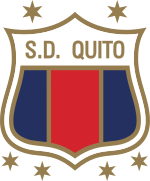Deportivo Quito
| Deportivo Quito | |||

|
|||
| Basic data | |||
|---|---|---|---|
| Surname | Sociedad Deportivo Quito | ||
| Seat | Quito , Ecuador | ||
| founding | 1955 | ||
| president | Juan Manuel Aguirre | ||
| Website | deportivoquito.com | ||
| First soccer team | |||
| Head coach | Renato Salas | ||
| Venue | Estadio Olímpico Atahualpa | ||
| Places | 39,800 | ||
| league | Segunda Categoría | ||
| 2018 | 8th place (Pichincha) | ||
|
|
|||
Sociedad Deportivo Quito is an Ecuadorian football club from the capital Quito . The club was founded in 1955 and plays its home games at the Estadio Olímpico Atahualpa , which can accommodate almost 40,000 spectators. Deportivo Quito has won four Ecuadorian football championships , but is currently playing in the third-class Segunda Categoría .
history
The association Deportivo Quito was founded on February 27, 1955 in Quito, the capital of Ecuador. He replaced the association Sociedad Deportiva Argentina , which was launched in 1940. The club colors were red and blue, which are still characteristic of the club today. Since its inception, Deportivo Quito has played its home games at the Estadio Olímpico Atahualpa, which has a capacity of almost 40,000 spectators, making it one of the largest football stadiums in Ecuador.
In the 1950s and 1960s, Deportivo Quito had its first successes at national level. In 1957 they were a founding member of Serie A, the first professional league in Ecuador and to this day the country's top division. Seven years later, in 1964, the time had come and the club became Ecuadorian football champions for the first time after taking first place in the league and winning the championship playoffs against CD El Nacional and LDU Quito . Four years later, the club was able to celebrate the second championship. After relegations from Serie A and the second division championship in 1980, Deportivo Quito only became champions again in 2008. The club had already distinguished itself through excellent youth work, various players of the Ecuadorian national team , which took part in a soccer world championship twice in a row in 2002 and 2006 , came from the club's youth department, for example Álex Aguinaga , Ulises de la Cruz and Edison Méndez . But it wasn't until these players had long played in Europe or better leagues in South America that really good times began again for Deportivo Quito. In 2008 and 2009, the championship was won twice in a row, in the 2010 season they finished fourth, while local rivals Liga de Quito won the championship. In the 2011 season, however, it was that time again that Deportivo Quito were the best team in Ecuador. After first Emelec had won the first half of the season, Deportivo Quito was able to decide the second half of the season for themselves, which brought a playoff for the championship. This was won by the team of the Argentine coach Carlos Ischia 2-0 (1-0 in the first leg in Guayaquil , 1-0 in the second leg in Quito), making the capital city club soccer championship for the fifth time.
After 36 years of membership in the first division, Deportivo Quito was relegated in 2015 and played in Serie B from 2016 . A year later, Quito was relegated from Serie B in 2016 and played in the regional third-class Segunda Categoría of Pichincha in 2017 .
So far, Deportivo Quito has taken part in the Copa Libertadores , the most important football tournament for club teams in South America, eight times . The greatest success came in 1989 , when they finished third in a group with Millonarios and the eventual tournament winner Atlético Nacional , both from Colombia , and league competitor Emelec Guayaquil, and survived the group stage for the only time to date. In the round of 16, however, it was over against the Chilean representative and two-time Libertadores finalist CD Cobreloa . In all other participations in the Copa Libertadores, the competition for Deportivo Quito was over after the first round. In the four participations in the Copa Sudamericana in 2008 , 2010 , 2011 and 2012 , no great successes could be achieved.
successes
- Series A : 5 ×
- 1964, 1968, 2008, 2009, 2011
- Series B : 1x
- 1980
- Participation in the Copa Libertadores : 8 ×
- 1965 : first round
- 1969 : first round
- 1986 : first round
- 1989 : Round of 16
- 1998 : first round
- 2009 : first round
- 2010 : first round
- 2011 : qualification
- 2012 : Round of 16
- Participation in Copa Sudamericana : 4 ×
Trainer
-

 Nelson Acosta (2012)
Nelson Acosta (2012) -
 Tabaré Silva (2014-2015)
Tabaré Silva (2014-2015)
player
-
 Álex Aguinaga (1984–1989)
Álex Aguinaga (1984–1989) -
 Ulises de la Cruz (1991-1994)
Ulises de la Cruz (1991-1994) -
 Marlon Ayoví (1992-2006)
Marlon Ayoví (1992-2006) -
 Edison Méndez (1996-2002)
Edison Méndez (1996-2002) -
 Luis Saritama (1999-2004, 2005-2006, 2008-)
Luis Saritama (1999-2004, 2005-2006, 2008-) -
 Raúl Guerrón (1999-2005)
Raúl Guerrón (1999-2005)